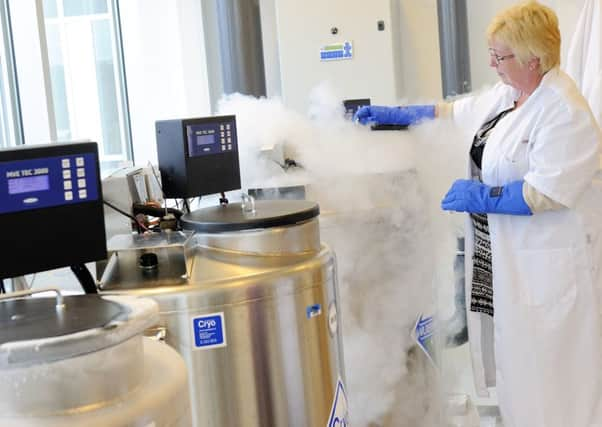Declining birth rate in Scotland sparks IVF appeal for egg freezing on NHS


The proposal, aimed at reversing declining fertility rates, would give women and couples the chance to access fertility treatment to freeze their eggs.
Scottish Conservative MSP Miles Briggs has written to Health Secretary Jeane Freeman asking her to consider creating a national service to help those wishing to have children.
Advertisement
Hide AdAdvertisement
Hide AdThe move comes amid reports last week that older women are being exploited by in vitro fertilisation clinics “trading on hope” despite a low success rate.
Newly published figures show the number of women undergoing fertility treatment in the UK has doubled since 2004 to 10,835 cases in 2017.
The figures from the independent regulator, the Human Fertilisation and Embryology Authority (HFEA), show that, among those using their own eggs, out of 2,265 embryo transfers in 2017, just 75 women aged 43 to 44 ended up with a baby.
For those over 44, the success rate dropped to 1 per cent between 2004 and 2017.
At present, egg freezing – which involves collecting a woman’s eggs, freezing them and then thawing them later on so they can be used in fertility treatment – is not normally available on the NHS unless patients are having medical treatment which could affect their fertility.
Briggs said: “It is vital that we look to address declining fertility rates in Scotland and such a move can represent an opportunity for women and couples to plan for future pregnancy. In other countries, such as Japan, women and couples choosing to freeze their eggs has helped improve fertility rates and steps have been taken to help reduce the costs around this.
“With women and couples choosing to delay when they start a family, such opportunities are important and increasingly becoming the norm globally.”
The city of Urayasu in Japan allocated 90 million yen (£630,000) to a three-year pilot project to help women cover the cost of freezing their eggs as parts of efforts to address the country’s declining birth rate.
Advertisement
Hide AdAdvertisement
Hide AdBriggs added: “Scotland has made welcome progress in the provision of three cycles of IVF and the debate around fertility treatments, including the freezing of eggs, is an important one, and one the Scottish Government should be considering.
“I hope the Cabinet Secretary for Health will consider the potential for a national service to be developed for women and couples in Scotland.”
Scotland has led the way in the provision of IVF treatment on the NHS since 1 April 2017, with eligible patients who are new referrals potentially being offered up to three cycles of treatment where there is a reasonable expectation of a live birth. The definition of infertility for couples falls into three categories: infertility with an appropriate cause of any duration; unexplained infertility of two years for heterosexual couples; and unexplained infertility following six to eight cycles of donor insemination for same sex couples.
The Scottish Government says the target for IVF referrals has been exceeded for the past three years, and over the past 18 months all eligible patients have started treatment within a year of referral.
Over the past five years the Government has invested £28 million to reduce IVF waiting times and improve the outcomes for patients.
According to HFEA figures in 2016, 18 per cent of IVF treatments using a patient’s own frozen eggs were successful.
A spokesperson for the Scottish Government said: “A sub-group of the National Infertility Group is currently developing options for fertility preservation and aims to complete its work by the end of this year.
“This work involves developing guidelines and pathways, including patient access criteria, for fertility preservation and storage in order to ensure equity of access across Scotland.”